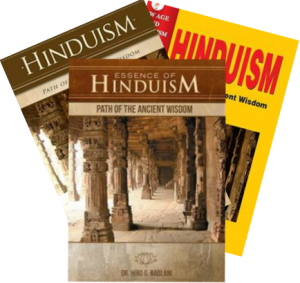Toward the end of their stay in the forest, Ramayana portrays a powerful climax, complete with drama, emotion, and action. The mighty, learned, but evil-minded and misguided king of Sri Lanka, Ravana, arrived on the scene to depict the havoc of lust in human life. Lured by the beauty of Sri Sita, Ravana first sent his ally Maricha in the garb of a golden deer to tempt the gullible her, who at once fell for his outward appearance. She persuaded Rama to follow the deer and try to capture it for her amusement. When Rama had not returned after a considerable time, Sita sent Lakshmana to search him. Before leaving, Lakshmana drew a line across the doorway and instructed Sita not to cross the line, for her own security. Ravana now came himself in disguise, and he approached Sita as an ascetic for alms. He then lured her with deceptive words to come out, crossing the line drawn by Lakshmana.
Many centuries later, parents, elders, and others who cared for young men and women would tell them not to cross the Lakshman Rekha—the limit of propriety—to safeguard against any evil in hiding. They would be warned, especially the women, to observe the rules of the discipline; otherwise, they might suffer the consequences of protracted harm and humiliation, which Sita had to suffer at the hands of the wicked Ravana. Valmiki chose the most powerful character of Sita, the mother symbol in all Hindu culture, to depict human weakness and to prove beyond any shadow of doubt that a person may be vulnerable at any time.
After Ravana abducted Sita, Rama sent his emissary, Hanuman, to search for her. Hanuman was the monkey god, and he told Ravana—directly and through other noble souls in his court, especially his brother Vibhishna—to wean himself from the path of vice and return Sita to Rama. But Ravana was too obsessed with the desire of physical indulgence with Sita. Desire makes man blind, and he loses his power of discretion. Also, Ravana was too arrogant. Even though Ravana had obtained special boons from God because of his knowledge and meditation, in the end he lost everything. Any person who follows the path of sin and arrogance is, therefore, called a Ravana. Ramayana is the story of victory of virtue over vice.
In the Ramayana, the role of Sri Hanuman is indeed most special. Hanuman has been portrayed as monkey and is thus symbolic of subhuman genesis. But his devotion, sincerity, strength, love, and sacrifice have been much more than any human capability. In this epic, once again Lord Rama cuts across the false barriers and puts the greatest honor on the head of Hanuman—he is elevated to be a god in Hindu religion and even is considered to be the avatara (incarnation) of Lord Shiva. Hanuman is shown rubbing sindoor all over body for his Lord’s long life, in response to Sita’s putting sindoor on her forehead for Rama’s long life.
After defeating Ravana, Rama gave back the kingdom to Vibhishna, the brother of Ravana, thus establishing an eternal legacy for the Hindus that they might not usurp any possession that does not belong to them. To this day, nearly one billion Hindus across the world celebrate the returning of Rama as their most important festival, Diwali—the Festival of Lights. (Sita’s banishment to the forest is described in a section of Ramayana called Uttara Ramayana. This entire section may well be an interpolation, written and inserted much later than Vamiki’s original Ramayana, as the language is not consistent with the original Ramayana.)
Swami Vivekananda has described the immortal character of Rama in these words:
“Rama, the embodiment of truth, of morality, the ideal son, the ideal husband, the ideal father, and above all the ideal king, this Rama has been presented.”48
In the earlier Vedas, it was proclaimed “Ahimsa Parmo Dharma”-Non-violence is the primary dharma. However, it was soon realized that violence cannot always be averted. When all other methods of dealing with an unjust and unrighteous situation do not yield the desired result, one may be compelled to use force and power to protect the innocent and pure from evil and sinful. Lord Rama thus vanquished Ravana to uphold morality, and destroy wickedness; non-violence was no longer unconditional and absolute in Hindu society.
After defeating Ravana however, Rama gave back the kingdom to Vibhishna, the brother of Ravana, thus establishing an eternal legacy for the Hindus that they might not usurp any possession that does not belong to them. Hindus have honored this bequest ever since.




